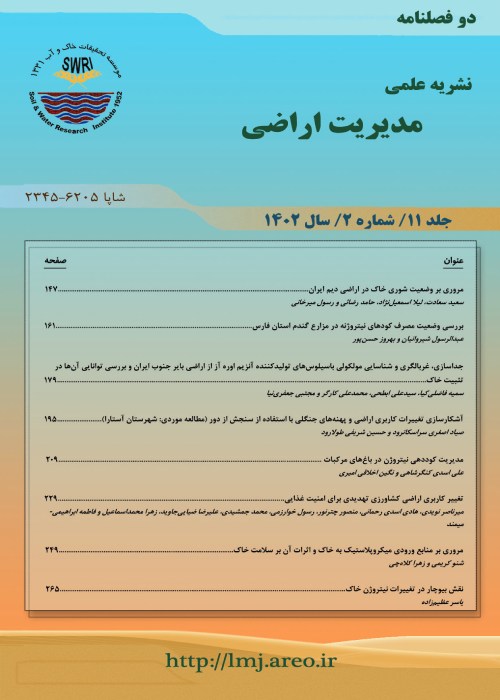Applicationof Arak Wastewater Treatment Plant Effluent on Agricultural Farms
Author(s):
Abstract:
Being located in a(semi-)arid region, Iran has been facing severe droughts in recent years complicated by the increasing urbanization. These conditions have led to a growing pressure on renewable water resources and, greater attention has been, therefore, drawn to efficient use of unconventional water resources such as urban and domestic effluents. Wastewater reuse is of great importance for the study area as a solution to overcome the growing demand for water. At the time of this study, the effluent from Arak wastewater treatment plant (WWTP) was being discharged into the Mighan desert where it is reused by downstream farmers in an unplanned manner. Concerns over public health and introduction of pollutants into soil, water, and agricultural products call for a well-planned agricultural reuse policy based on investigations of the effluent quality. The present descriptive, cross-sectional study was, therefore, conducted to determine the quality parameters of the effluent from Arak WWTP against the relevant standards and to determine its usability for irrigation. For this purpose, samples were collected from the effluent and the required tests were performed. Results revealed average values of 49.65, 23.26, and 1.93 mg/l for COD, BOD5, and DO, respectively, and 0.0564, 0.08, and 0.512 mg/L, respectively, for the heavy metals of Cadmium, copper, and lead. These values are in compliance with the limits recommended by Iran Environmental Protection Organization for wastewater reuse in agriculture. Total and fecal coliforms were, however, found to be 877.882 and 379.5588 per 100 mL and the average number of parasite eggs was 0.524 per liter, which violate the relevant standards. Based on the result obtained, the effluent seems to have no limitation for reuse in agricultural irrigation except for its total and fecal coliforms. Thus, disinfection and continuous monitoring of the effluent along with upgrading of the WWTP facility are strongly recommended for its effluent to be reusable. Over all recommendation for agricultural reuse of the effluent can be certainly made once in-depth research has been carried out.
Keywords:
Language:
Persian
Published:
Journal of Land Management, Volume:4 Issue: 2, 2017
Pages:
175 to 189
https://magiran.com/p1685731
دانلود و مطالعه متن این مقاله با یکی از روشهای زیر امکان پذیر است:
اشتراک شخصی
با عضویت و پرداخت آنلاین حق اشتراک یکساله به مبلغ 1,390,000ريال میتوانید 70 عنوان مطلب دانلود کنید!
اشتراک سازمانی
به کتابخانه دانشگاه یا محل کار خود پیشنهاد کنید تا اشتراک سازمانی این پایگاه را برای دسترسی نامحدود همه کاربران به متن مطالب تهیه نمایند!
توجه!
- حق عضویت دریافتی صرف حمایت از نشریات عضو و نگهداری، تکمیل و توسعه مگیران میشود.
- پرداخت حق اشتراک و دانلود مقالات اجازه بازنشر آن در سایر رسانههای چاپی و دیجیتال را به کاربر نمیدهد.
In order to view content subscription is required
Personal subscription
Subscribe magiran.com for 70 € euros via PayPal and download 70 articles during a year.
Organization subscription
Please contact us to subscribe your university or library for unlimited access!



